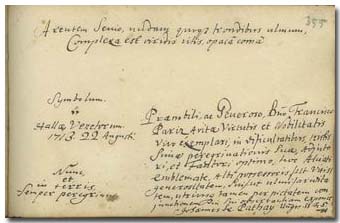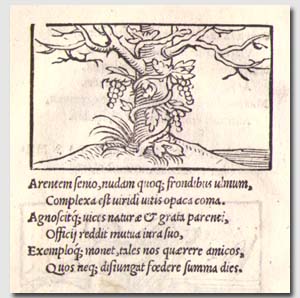
Arentem Senio, viridam quoque frondibus ulmum,
Complexa est viridis vitis, opacâ comâ. *
Praenobili, ac Generoso, D[omi]no Francisco Pariz Avitae Virtutis
et Nobilitatis Viro exemplari, in dificultatibus tristissimae
peregrinationibus suae, Adjutori, et Fautori optimo, hoc Alciati
emblemate, Albi possessoris (ut Vitis) generositatem, sui (ut
ulmi) ariditatem, utriusque tamen per pietatem conjunctionem in
sui observantiam exponit
Johannes Sz. Pathay Ung[aru]s SS. Th[eologiae] S[tudiosus]

Hallae Venetorum. 1713. 22 Augusti.
Nunc, et in terris, semper peregrinus.
|
* The quotation consists of
the first two verses of Alciato, Emblemata 160
(Amicitia etiam post mortem durans) (cf. below, from the first
edition, Augsburg 1531). The original text has “viridi vitis
opaca coma”, that is “viridis” refers to “coma” and not to
“vitis”.
 *
The two yods of the motto are the abbreviation of the
four-letters divine name “Tetragrammaton” in post-Biblical
Hebrew literature. The two small dashes between the yods
indicate that it is an abbreviation – albeit somewhat
incorrectly, for in Hebrew manuscripts the two yods are
written without any indication of the abbreviation, and also
because two dashes traditionally indicate the
abbreviation of more than one word.
|
|
|
A vine, covered in vibrant greenery, has embraced an elm, dry with
age and even stripped of foliage. *
To the very noble and illustrious Ferenc Pápai,
example of ancient virtue and nobility, my supporter and protector
in the middle of my sad peregrination, with this emblem of Alciato
I represent the generosity of the owner of this album (like of the
vine) and the aridity of myself (like of the elm), while both are
related by piety.
Johannes Sz. Pathay, Hungarian student of
theology
Motto: [“God”] *
In Halle of the Venets, on August 22, 1713.
Now, and here on earth always peregrine.
|
p.
355. Halle, August 22, 1713
Patai János
(active between 1706-1717),
Transylvanian Reformed pastor
János Patai (Pathai) (Sz.?) passed to superior classes
(“subscribed”) in the College of Nagyenyed (Aiud) on June 16,
1706. The register writes on him: “Ludimag. Mohainus. Plebanus
Saxopolitanus. vir (?) doctissimus” [Jakó-Juhász 124]. That is, he
was an erudite man, schoolmaster in the village of Moha
(Nagyküküllő county, today Grînari) and later pastor in Szászváros
(Orãştie). In 1711 he immatriculated at the university of
Frankfurt an der Oder, where he disputed in 1712. In 1713 he went
to the university of Halle; Hungarian students of this town often
mention of him in their letters. These testify that Patai left
Halle in the same year, returned home, and in 1717 he still was in
Transylvania. His dissertation was published:
Dissertatio theologica de quatuor novissimis. Francofurti ad
Viadrum, 1712.
János Patai wrote in the album on August 22, 1713 in Halle,
dedicating his memento to his best supporter and protector
(adiutori et fautori optimo). Ferenc Pápai Páriz often asked,
argued and intermediated for his companions. – Although the name
of János Patai often occurs in the letters of Hungarian students,
his identification and his distinction from others of the same
name is sometimes uncertain. Various biographies also give
different data on him. – Here in the album some pages written in
Halle follow each other (pp. 339,
351, 352,
353, 355) that all
use different historical names of the town, referring to the
ancient Venets, to the Archbishopric of Magdeburg, and to Saxony.
• Dáné 28 • Graaf • Jakó-Juhász 124 • Peregrinus •
PIM • Pintér • Szabó-Szögi 359 • Szinnyei • Zoványi-Ladányi |

